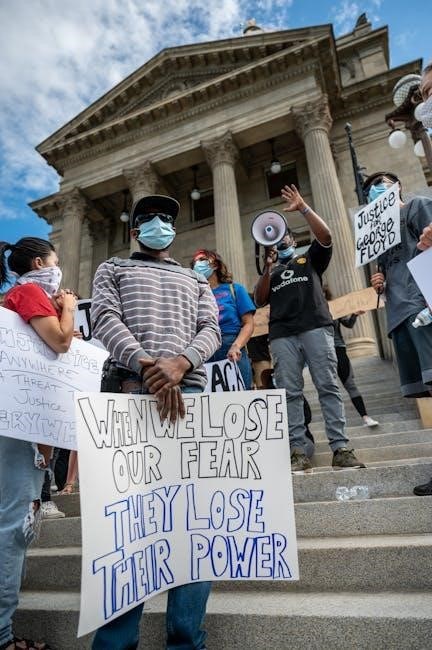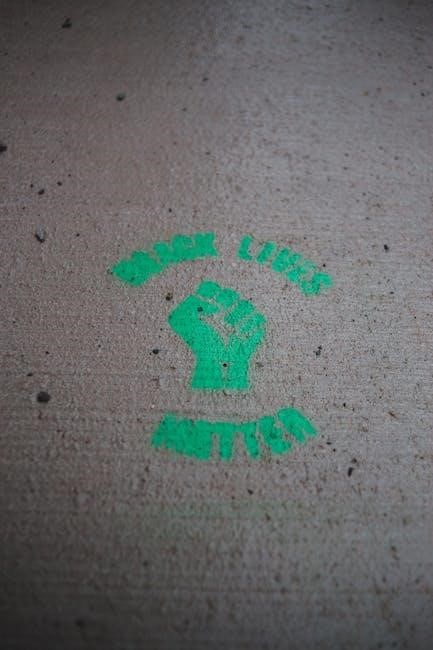Justice is a fundamental concept in philosophy‚ ethics‚ and law‚ focusing on fairness‚ morality‚ and the distribution of rights. Michael Sandel’s “Justice: What’s the Right Thing to Do?” explores these themes‚ emphasizing the importance of moral reasoning in society. The book‚ based on his Harvard course‚ delves into theories of justice‚ challenging readers to think critically about ethical dilemmas. Sandel argues that justice involves more than legal frameworks; it requires understanding human values and the common good. His work highlights the complexity of balancing individual rights with societal needs‚ making it a pivotal resource for understanding justice in modern contexts.
1.1. Definition and Scope of Justice
Justice is a multifaceted concept centered on fairness‚ morality‚ and the equitable distribution of rights and resources. It encompasses the moral and legal principles that guide societies in upholding fairness and equality. According to Michael Sandel‚ justice involves more than adherence to laws; it requires a deeper understanding of what is morally right. The scope of justice extends to individual rights‚ liberties‚ and opportunities‚ ensuring that individuals are treated without bias or discrimination. Sandel’s work highlights the complexity of justice‚ emphasizing its role in resolving ethical dilemmas and balancing competing values. Justice‚ therefore‚ serves as a foundation for creating a fair and equitable society‚ addressing both individual and collective well-being. Its definition and scope continue to evolve‚ shaped by philosophical‚ legal‚ and ethical considerations.
1.2. Historical Context of Justice in Philosophy
Justice has been a central theme in philosophy throughout history‚ with roots in ancient Greek thought. Plato’s Republic explored justice as harmony in the soul and society‚ while Aristotle emphasized distributive justice in his Nicomachean Ethics. The concept evolved through the Enlightenment‚ with thinkers like Hobbes‚ Locke‚ and Rousseau linking justice to social contracts and natural rights. Immanuel Kant later introduced deontological ethics‚ focusing on moral duties rather than outcomes. In the 19th century‚ utilitarianism emerged‚ with John Stuart Mill arguing that justice aligns with the greatest happiness for the greatest number. These historical ideas form the foundation of modern philosophical debates. Michael Sandel’s work draws on this rich tradition‚ examining how justice intersects with morality‚ rights‚ and the common good in contemporary society.

Key Theories of Justice
Key theories of justice include utilitarianism‚ Kantian ethics‚ Rawls’ justice as fairness‚ and Aristotelian virtue ethics. Each theory offers distinct perspectives on morality‚ rights‚ and fairness.
2.1. Utilitarianism and the Greatest Good
Utilitarianism‚ as discussed in Michael Sandel’s “Justice: What’s the Right Thing to Do?”‚ posits that actions are morally right if they maximize overall happiness or well-being. This theory‚ rooted in the works of Jeremy Bentham and John Stuart Mill‚ emphasizes the greatest good for the greatest number. Sandel explores how utilitarianism prioritizes outcomes over moral rules‚ often leading to ethical dilemmas. For instance‚ sacrificing one person to save others might be justified under this framework. Critics argue that utilitarianism oversimplifies complex moral situations and ignores individual rights. Sandel highlights these tensions‚ encouraging readers to critically evaluate the limits of utility in defining justice. This theory remains central to debates about morality‚ fairness‚ and the distribution of resources in society.
2.2. Kantian Ethics and Moral Duties
Kantian ethics‚ as explored in Michael Sandel’s “Justice: What’s the Right Thing to Do?”‚ emphasizes moral duties and the categorical imperative. Immanuel Kant argued that actions are morally right if they align with maxims that could be universally applied. This deontological approach prioritizes duties over outcomes‚ contrasting with utilitarianism. Kant’s theory asserts that individuals should be treated as ends in themselves‚ not means to an end. Sandel examines how Kantian ethics challenges consequentialist reasoning‚ highlighting tensions between moral rules and societal benefits. For example‚ lying‚ even to prevent harm‚ violates the categorical imperative. This framework underscores the importance of respecting human dignity and moral obligations‚ offering a distinct perspective on justice that emphasizes right actions over desirable outcomes.
2.3. Rawls’ Theory of Justice as Fairness
John Rawls’ theory of justice as fairness‚ discussed in Michael Sandel’s “Justice: What’s the Right Thing to Do?”‚ proposes a framework for a just society. Rawls introduces two principles of justice: the first ensures equal basic rights and liberties‚ while the second allows inequalities only if they benefit the least advantaged. His concept of the original position imagines individuals choosing societal rules from behind a veil of ignorance‚ ensuring fairness without bias. This theory emphasizes fairness and equality‚ contrasting with utilitarian approaches that prioritize overall happiness. Rawls’ approach seeks to balance individual rights with social welfare‚ offering a structured vision of justice that has significantly influenced modern political philosophy and ethical debates.
2.4. Aristotelian Virtue Ethics and Justice
Aristotelian virtue ethics‚ explored in Michael Sandel’s “Justice: What’s the Right Thing to Do?”‚ emphasizes the cultivation of moral character and virtues as the foundation of justice. Aristotle argued that justice is achieved when individuals act virtuously‚ striving for eudaimonia (human flourishing). He distinguished between distributive justice (fair distribution of goods) and corrective justice (rectifying wrongs). Virtue ethics focuses on the moral agent’s character rather than on rules or consequences‚ suggesting that just actions flow from a virtuous person. Sandel highlights how Aristotle’s approach contrasts with modern theories like Rawls’ or Kant’s‚ offering a unique perspective on justice as a way of life rooted in ethical habits and the pursuit of the common good.
Moral Reasoning and Ethical Dilemmas
Moral reasoning involves balancing rights‚ duties‚ and consequences‚ often requiring difficult ethical decisions. Sandel’s work explores how individuals navigate dilemmas‚ applying ethical theories to real-world challenges.
3.1. The Role of Rights and Liberties
Rights and liberties are fundamental to justice‚ ensuring individuals can act freely without oppression. Sandel emphasizes that these rights are not absolute but must be balanced with societal needs. In his book‚ he discusses how rights often conflict‚ requiring careful moral reasoning. For instance‚ freedom of speech may clash with privacy rights. Sandel argues that a just society must protect basic liberties while ensuring they do not harm others. His exploration challenges readers to consider how rights are distributed and prioritized‚ highlighting the complexity of maintaining fairness in a diverse world. This balance is crucial for achieving justice in modern societies.
3.2. Distributive Justice and Fairness
Distributive justice focuses on the fair allocation of resources‚ goods‚ and opportunities within society. Sandel discusses how different theories‚ like utilitarianism and Rawls’ justice as fairness‚ approach distribution. Utilitarianism aims to maximize overall happiness‚ while Rawls advocates for ensuring the least advantaged are not worse off. Sandel highlights the tension between merit-based distribution and need-based systems‚ questioning what fairness truly means. He uses real-world examples‚ such as income inequality‚ to illustrate these concepts. Sandel’s analysis encourages readers to evaluate their own beliefs about fairness and how resources should be distributed. This reflection is essential for understanding the moral dimensions of distributive justice in contemporary society.
3.3. Morality vs. Law in Modern Society
Michael Sandel explores the complex relationship between morality and law‚ arguing that laws should not merely reflect majority moral opinions. He emphasizes that moral values should guide legal principles but warns against imposing specific moral beliefs on society. Sandel uses examples like abortion and same-sex marriage to illustrate how moral disagreements often underlie legal debates. He argues that laws should protect basic rights and liberties‚ even when they conflict with certain moral views. Sandel’s approach challenges readers to think critically about when the law should enforce morality and when it should respect individual freedoms. This distinction is crucial for fostering a just society that balances ethical diversity with legal coherence.

Real-World Applications of Justice
Justice applies to economic systems‚ social equity‚ and criminal law‚ addressing ethical dilemmas like gene editing and market fairness‚ shaping a balanced society.

4.1. Economic Justice and the Free Market
Economic justice in the free market involves ensuring fair distribution of wealth and opportunities. Michael Sandel’s work highlights the tension between efficiency and fairness‚ questioning whether markets alone can deliver justice. Distributive justice‚ a key concept‚ emphasizes allocating resources based on moral principles rather than market outcomes. Sandel argues that unfettered capitalism may prioritize profit over equality‚ leading to inequality. He explores how policies like progressive taxation and social welfare can balance market freedom with fairness‚ ensuring access to primary goods such as income‚ rights‚ and opportunities for all. This approach aligns with theories like Rawls’ Justice as Fairness‚ promoting a system where economic inequality benefits the least advantaged‚ fostering a just society.
4.2. Social Justice and Human Rights
Social justice emphasizes equality‚ dignity‚ and human rights for all individuals. Sandel’s work explores how society ensures fair treatment and opportunities‚ addressing issues like discrimination and inequality. He argues that justice involves recognizing inherent human dignity‚ which should not be compromised by factors like race‚ gender‚ or class. Sandel discusses the moral imperative to protect human rights‚ even when they conflict with cultural or legal norms. By examining real-world dilemmas‚ such as affirmative action and same-sex marriage‚ Sandel illustrates the challenges of balancing individual freedoms with collective responsibilities. His approach advocates for a society where human rights are upheld‚ promoting justice through moral reasoning and ethical awareness‚ ensuring equal respect and dignity for all individuals.
4.3. Criminal Justice and Punishment
Criminal justice systems aim to maintain social order through punishment and rehabilitation. Sandel examines the moral foundations of punishment‚ questioning whether retribution‚ deterrence‚ or rehabilitation should guide criminal justice. He argues that punishment must be proportional to the crime and respect human dignity. Sandel also explores ethical dilemmas‚ such as the morality of capital punishment and the fairness of sentencing disparities. His analysis highlights the tension between individual responsibility and societal factors contributing to crime. By focusing on justice as fairness‚ Sandel advocates for a system that balances accountability with compassion‚ ensuring that punishment serves both to deter wrongdoing and to uphold the moral values of society.
Michael Sandel’s exploration of justice challenges readers to reflect on morality‚ rights‚ and societal values. His work emphasizes the importance of critical thinking in understanding justice and its application in modern life.

5.1. The Evolution of Justice in Contemporary Thought
Contemporary thought on justice has evolved significantly‚ influenced by philosophers like Michael Sandel‚ who challenge traditional notions of morality and rights. Sandel’s work emphasizes the complexity of justice‚ advocating for a nuanced approach that considers human values and societal contexts. His ideas have sparked debates on issues like gene editing‚ economic inequality‚ and moral dilemmas‚ reflecting the dynamic nature of justice in modern society. By addressing these topics‚ Sandel’s work highlights the relevance of justice in navigating the challenges of today’s world‚ encouraging a deeper reflection on what it means to act justly in an increasingly complex global landscape.
5.2. The Relevance of Sandel’s “Justice: What’s the Right Thing to Do?” Today
Michael Sandel’s “Justice: What’s the Right Thing to Do?” remains highly relevant today‚ offering insights into contemporary ethical dilemmas. The book’s exploration of moral reasoning‚ rights‚ and fairness resonates with current debates on social justice‚ economic inequality‚ and human rights. Sandel’s arguments against moral relativism and his emphasis on civic engagement encourage readers to critically evaluate societal norms. His approach to justice as a virtue‚ rather than merely a legal concept‚ provides a framework for addressing issues like gene editing‚ free markets‚ and punishment. The text’s accessibility and real-world examples make it a valuable resource for understanding justice in modern‚ multicultural societies‚ ensuring its continued influence in both academic and public discourse.
